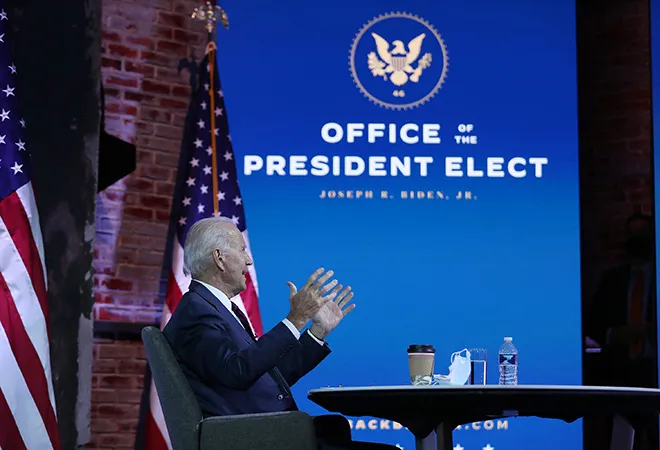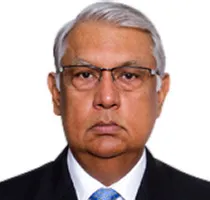-
CENTRES
Progammes & Centres
Location
Biden has a long list of policy decisions taken by Trump during his term that he will have to work on correcting. Not all of them will be easy to reverse

There is no escape route for Donald Trump, other than handing over the keys of the White House to Joe Biden on 20 January 2021. The US president’s legal attempts, derisively labelled “legal theatre”, will not be able to overturn the results of the American presidential election. Many of his lawsuits have been thrown out by state courts.
Among Republicans, Trump is gradually losing support. In his last public appearance a few days ago, Trump gave a hint of conceding defeat but may try to negotiate some terms for his departure, which could include a blanket pardon on lawsuits that he is facing after he loses immunity from legal action. He would be eager to ensure that he can return as a presidential candidate in 2024.
More and more world leaders have congratulated Biden-Harris on their electoral victory. The duo created electoral history, bagging the highest number of popular votes. Trump too polled more popular votes this time than in 2016, clearly underlining the massive polarisation in American society. It is quite extraordinary that so many voters backed Trump, who elevated disruption as a powerful tool of policy, encouraging an irresponsible attitude to fighting Covid and atavistic racist impulses that has energised the “Black Lives Matter” movement.
Trump’s supporters firmly believe that he has been a successful President. This election has also thrown up another trend wherein Americans voted for Biden but chose their Republican candidate for the Senate and the House of Representatives. The first major policy reversal will be on battling the pandemic that has claimed the maximum victims globally in the US and continues its rampage. Biden has already assembled a new team coordinating efforts to fight Covid, which includes Dr Vivek Murthy of Indian origin.
He has declared that he will adopt a science-based approach, invest in research and public health, call for a national policy on wearing masks and extensive testing. The healthcare sector will be at the core of Biden’s domestic policy. On immigration, Biden is likely to roll back laws that separated immigrant children from their parents on account of improper documentation, reinstate asylum rights for certain categories of oppressed people, cut funding for construction of the wall on the Mexican border and bring back the naturalisation process for citizenship.
Lifting of the visa ban on certain Islamic countries, increasing intake of refugees into the nation and removing restrictions on H1B visa may be other crucial changes. All this will be accompanied by more diligent screening of immigration cases. On the foreign policy front, repairing relations with friends and allies will certainly be a priority. Trump’s foreign policy approach had led to divisions in the Western bloc and disengagement with multilateral institutions.
The efforts made by Trump to cajole NATO allies to contribute more and raise their defence allocations is likely to continue, albeit in a less abrasive manner. Russia will remain a target. Rejoining the WHO will be the first step in reclaiming America’s standing in the multilateral arena. In the Asian theatre, Biden is likely to leverage Trump’s anti-China policy to wrest advantages for the US. Trump’s initial policies and the pandemic created space for China to flex its muscles.
Under Biden, China may see this space reduced and pressure on trade issues, human rights, South China Sea, Taiwan and Hong Kong unlikely to ease. Will the US seek to return to the TPP, now renamed CPTPP? It is not a part of the RCEP and its policies on trade issues will be watched ardently. Biden will not be able to move away significantly from the hard line that Trump had pursued. The latter was seen to have helped the American economy, which bolstered public perception that the US has been getting a raw deal on trade issues.
Reviving the Iran nuclear deal, the JCPOA, can be expected but it will be hugely complicated. Iran’s supreme leader Ayatollah Khamenei’s scathing comments on the American election do not indicate any desire to ease tensions. Iran remains an ideological Islamic “Mullahcracy”, viscerally opposed to the US. Iranian President Rouhani has tempered the harsh statement of Khamenei by announcing that Iran will seize any opportunity to ensure that sanctions are lifted, indicating that the window for negotiations has not been slammed shut.
Iran has steadily drifted into the China-Russian sphere of influence and negotiations with the US may help Iran to balance its relationship with major powers. But long-term improvement in bilateral ties with the US is unlikely to occur. India-US relations remained generally healthy during Trump’s tenure and PM Modi’s personal cultivation of Trump helped. Defence and technology ties prospered. America was supportive of India during serious strains in ties with Pakistan and China.
Biden is not an unknown quantity in Delhi and Indian sentiments on Kamala Harris will certainly add to expectation of bilateral ties improving further. Both sides must be careful about not upsetting the enhanced strategic convergence by public pronouncements on human rights or CAA or fundamental shifts towards Pakistan and China. The H1B visa liberalisation will benefit American and Indian IT companies, whose balance sheets have taken a hit due to Trump’s restrictions. India-US trade in services will get a boost and the bottom lines of IT companies will improve.
Immigrants have always been important for innovation and American technological leadership, which are increasingly being threatened by China’s overdrive for supremacy in this domain. On trade issues, differences ranging from high tariffs, non-tariff barriers, IPRs, data protection laws, tax on digital companies like Facebook and Google and digital retail giants like Amazon will remain on the bilateral agenda. GSP restoration is unlikely, unless it happens as part of a bilateral trade deal. The challenge for India will be to build on the progress made during Trump’s tenure and expand the convergence on bilateral and global issues with the Biden administration.
This commentary originally appeared in The New Indian Express.
The views expressed above belong to the author(s). ORF research and analyses now available on Telegram! Click here to access our curated content — blogs, longforms and interviews.

Pinak Chakravarty was a Visiting Fellow with ORF's Regional Studies Initiative where he oversees the West Asia Initiative Bangladesh and selected ASEAN-related issues. He joined ...
Read More +